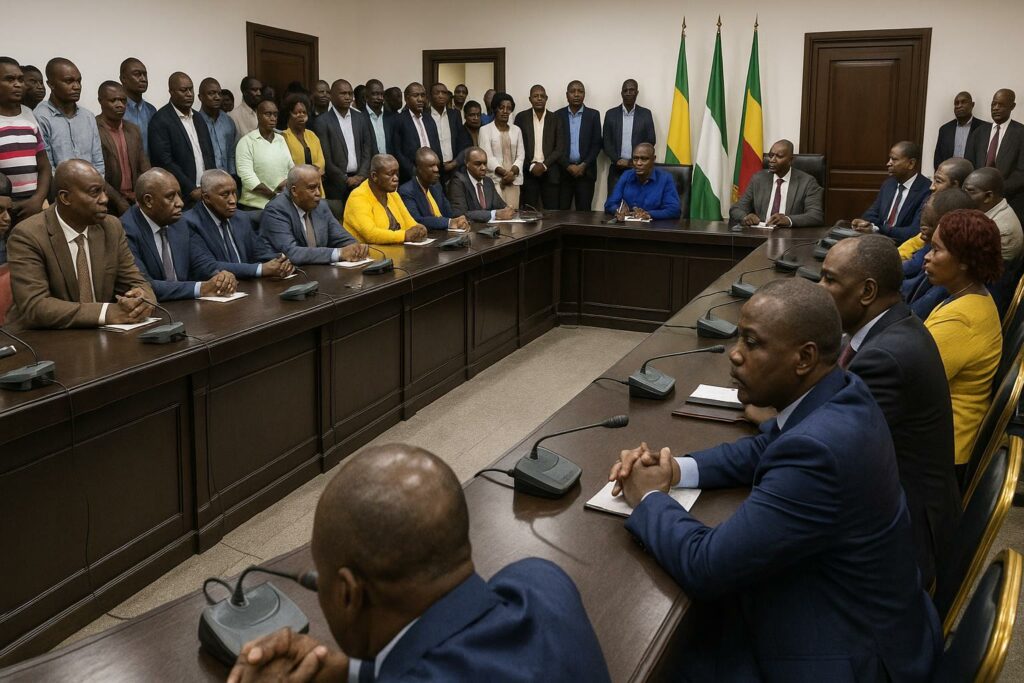Ceremony Signals Fiscal Determination
Beneath the high ceilings of the Ministry of Finance in Brazzaville, Director of Cabinet Paul Malié presided over the formal installation of nine central directors at the Directorate-General of Customs and Indirect Duties. The 5 November ceremony, held only five days after the officials’ nomination by Prime-Ministerial Decree 2025-440 of 31 October 2025, punctuated a decisive moment for an administration tasked with safeguarding the Treasury’s frontline revenue stream.
In his address, Malié set the tone for the new tenure, reminding the appointees that customs receipts and related fiscal flows underwrite the day-to-day functioning of the Congolese State, from salary disbursement to public services. The exhortation was clear: performance, availability and integrity would be the metrics by which the hierarchy assesses its senior cadre.
Nine Portfolios, One Revenue Mandate
The reshuffle brings Albert Raphaël Dirat to Internal Audit; Camille Pea Menga Bongou to Studies and Forecasting; Alain Sambila to Customs Operations; Jean Richard Ngouala to Regulation and Litigation; Laetitia Kakou to Information Systems; Patricia Lydie Oyo Ebatha Franck to Finance and Equipment; Roger Xavier Okola to Customs Investigations; Fatima Raïssa Garcia to Human Resources; and Jean-Pierre Bassadila to Intelligence, Risk Analysis and Valuation.
While their portfolios differ, their collective mission converges on raising the velocity and reliability of fiscal inflows. By aligning audit, data management, legal compliance, intelligence and human capital, the Ministry aims to create an ecosystem where each directorate feeds evidence-based decisions at headquarters and at border posts alike.
Human Capital and Social Cohesion
Speaking moments after the oath, Director of Human Resources Fatima Raïssa Garcia stressed continuity with her predecessor while expanding the horizon of staff development. The customs mutual society of which she is president has traditionally focused on social welfare; her new remit now extends that ethos to career monitoring and targeted training so that, in her words, “a well-equipped workforce can rise to the challenges of customs administration.”
Her statement underscored a recognition that modern revenue services rely as much on motivated personnel as on cutting-edge scanners or risk-profiling algorithms. In a setting where employee welfare intersects with fiscal performance, Garcia’s dual experience promises a bridge between social cohesion and operational excellence.
Guardians of Norms and Compliance
For Jean Richard Ngouala, freshly entrusted with Regulation and Litigation, the post involves curating the corpus of regional and international norms to which Congo-Brazzaville is a signatory. He recalled that customs carries three complementary missions: fiscal, economic and social. The legal lens through which these missions are filtered will, under his stewardship, have to remain both vigilant and pragmatic, ensuring that every tariff classification, dispute settlement or exemption aligns with the overarching legislative framework.
Ngouala’s insistence on availability to hierarchy signalled a culture of responsiveness deemed essential when regulatory clarity must meet the beat-to-beat tempo of cross-border trade. In a region where harmonised tariffs and continental free-trade aspirations evolve rapidly, his directorate stands as the institutional compass.
Technology as Revenue Multiplier
Laetitia Kakou’s appointment to Information Systems points to the administration’s recognition that digital architecture is no longer an adjunct but a core revenue multiplier. From automated risk filters to electronic payment gateways, her brief centres on reducing manual bottlenecks and increasing traceability. Although the ceremony provided no numeric targets, the subtext was unambiguous: technology will either expose leakages or fortify collection, and leadership will make the difference.
Internal Audit and the Culture of Accountability
Albert Raphaël Dirat inherits Internal Audit at a juncture where transparency equates to credibility. Malié’s charge that directors embody the pillars on which headquarters depends elevates the audit function beyond tick-box compliance. A proactive audit culture, spearheaded by Dirat, is intended to reinforce public confidence, bolster donor dialogue and, crucially, safeguard the flow of receipts that finance national priorities.
A Revenue Backbone for National Ambitions
By foregrounding customs revenue as the backbone of public finance, Malié effectively linked the directors’ performance to the government’s broader ambitions under President Denis Sassou Nguesso. Infrastructure upkeep, social programmes and salary payments hinge on a steady customs pipeline. The symbolism of installing the nine officials in unison therefore transcended bureaucratic routine; it projected institutional cohesion and fiscal intent.
“The choices made in your favour are the best; move swiftly and prove that the hierarchy was right,” Malié concluded, encapsulating both confidence and a subtle reminder of accountability. Each director left the hall not merely with a title but with a mandate whose successful execution could ripple across the national budget.
Key Takeaway
The installation ceremony condensed a message of renewal: a re-energised customs leadership, calibrated around specialised competences, is now entrusted with maximising domestic revenue. In the intricate architecture of public finance, the new directors occupy nodes where policy meets practice, law meets logistics and technology meets human resolve. Their collective traction will determine how effectively the Republic of the Congo converts border activity into fiscal capacity.

